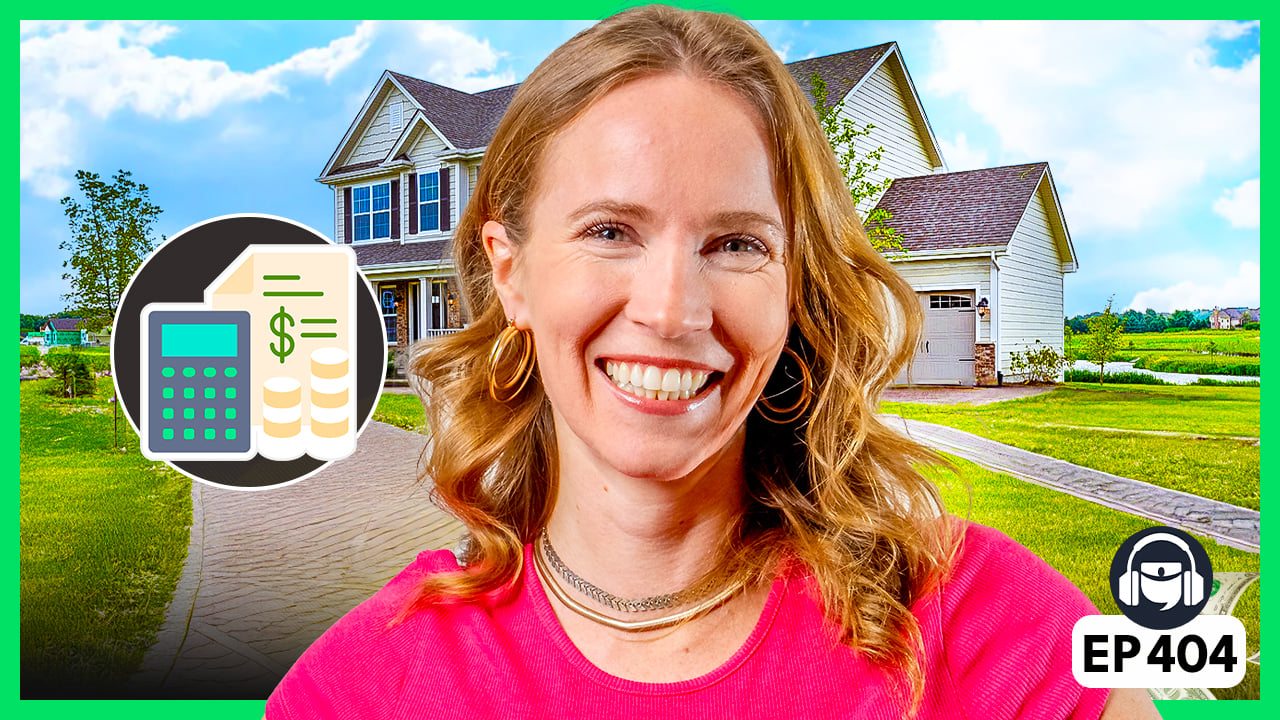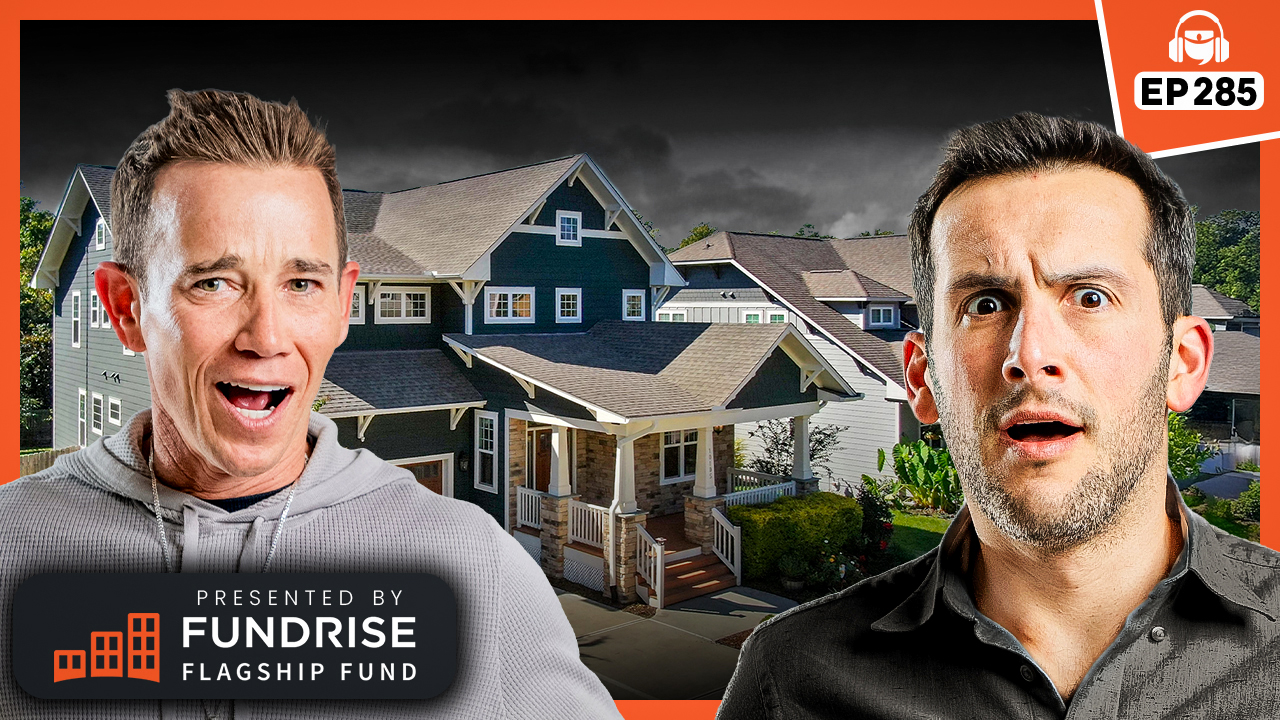How do you know if a rental property will make enough cash flow before you buy? Budgeting is KEY. When breaking down a deal, it’s critical that you account for the costs of all capital expenditures (CapEx), maintenance, and repairs. Overlooking an important line item could easily put you in the red!
Welcome back to another Rookie Reply! In today’s episode, we’re going to show you how to budget for the everyday operating costs that come with owning rental properties, as well as how to set minimum cash flow requirements when analyzing a rental. Should you find a partner for your next house hack? We get into the potential advantages and disadvantages of joining forces with other investors. We also talk about the many tax benefits in real estate and whether you need a limited liability company (LLC) to maximize them!
Ashley:
This is Real Estate rookie episode 404. My name is Ashley Care and I’m here with Tony j Robinson.
Tony:
Welcome to the Real Estate Rookie Podcast, where every week, three times a week, we bring you the inspiration, motivation, and stories you need to hear to kickstart your investing journey. And today we’ve got, as always, a lot of great questions for you. We’re going to talk about how to classify CapEx versus repairs and maintenance. We’re going to talk about cashflow requirements, what’s a good deal versus what’s not. But at first we’re going to be talking about everyone’s favorite phrase, tax write-offs. So our first question up comes from Stephanie Farber and Stephanie says, are write-offs different for homes in an LLC versus homes? In my primary name? This is a million dollar question and probably one that I think is a big misconception amongst new real estate investors. And I would encourage you guys to go back and just search for any episode we’ve done with Amanda Hahn.
She’s an amazing real estate, CPA, written a bunch of books for her and her husband, Matt McFarland, have written a bunch of books for BiggerPockets, so they can really give you the inside scoop. But here’s the thing, your LLC is not necessarily for tax purposes. Your LLC is for liability protection. So you can still claim deductions and business expenses through a property, even if it’s in your personal name. So the title doesn’t necessarily matter for your ability to write things off. The title is more so if someone needs to or not needs to, but if someone chooses to sue you or there’s some kind of liability event, the LLC is there to protect you. Now, there are some, like if you set up an S corp, there are some benefits to doing it that way. But when we talk about just owning rental property, whether the title is in Tony Robinson’s LLC, or if it’s in just Tony Robinson’s name, there’s no material benefit or downside either way. Ash, have you seen anything different from that?
Ashley:
No. And in New York State, when you file for an LLC, you can elect to have it as a disregarded entity for tax purposes. Meaning you are literally taxed the exact same as if you own this property in your personal name, it’s going on your personal tax return. You’re not even filing an LLC tax return because that’s only if you’re in a partnership for an LLC. So your LLC is still going to be on your personal return. So as far as write-offs and what you can do differently when you file an LLC or you’re paying fees on that LLC, the startup costs, so you’ll have a little more write off because you actually have to pay that money. Do I think that is a benefit? No, but, and then this isn’t really a tax advantage I would say, but if you do have an LLC, you can open a credit card in the LLCs name, you could use the reward points on that to get cash back or pay for travel, things like that too. So that’s one of the benefits of having an LLC. But yeah, as far as write-offs, they’re pretty comparable as to you’re not going to be able to write off more in one or the
Tony:
Other. And again, this goes back on a recent episode we did. We talked about the benefit of making sure that you’re separating things from a banking and bookkeeping perspective. So Stephanie, even if you keep the property in your own personal name, I would still encourage you to set up a separate bank account for that property or for your rental business. That way you’re not commingling any of the funds from the water bill at your primary residence and your groceries with all of the expenses related to your rental property. So only thing I caution you on is making sure you’re still getting some separation between the banking and the bookkeeping side. So we have a question coming up about qualifying for a house hack loan with a partner. But first we’re going to jump into a question about budgeting for property expenses. So this question comes from Carrie Chagnon and Carrie says, so I typically run my numbers with a 10% management fee, 10% going towards maintenance and 10% for CapEx.
I know most properties the tenants will pay utilities, or you can correct the rent to include it if you want to. But what about things like sewer trash removal, pest control, landscaping, snow removal, et cetera. Is this all part of the maintenance reserve per month or should that be added in separately? This is a great question, Carrie, and I’m glad we’re talking about this because I think a lot of Ricky investors tend to overlook some of the ongoing expenses related to managing a property. Now for us, since we do all short term, we got to take care of everything. So we don’t get to charge anything back to the guests aside from cleaning. But ash, obviously with you in your long-term rentals, what is your approach? Are you bundling sewer, trash and all those things in snow removal or is that just a separate line item for you? So we’ll get back to that after a quick word from our show sponsors.
Ashley:
So I think there’s two distinct categories you should focus on is one, your fixed expenses. These are going to be reoccurring every month, every week, every quarter, every year. So then you have your variable expenses, and these you do not when they’re going to happen, you don’t know what amount that’s going to be. So it’s variable. You can’t say, I know I’m going to spend a thousand dollars in repairs and maintenance for the year because you don’t know when the repairs and maintenance are going to come up. So that’s where I would begin with analyzing your deal. You’re going to take the fixed expenses first. So even if you don’t know exactly what the lawn care is going to be, you are going to know that you’re going to need to pay for it in May, June, July, August, September, maybe even October. So you can get a quote from somewhere and you can get pretty close defining when and how much you’re going to need to make that payment.
So say it ends up being $1,200 for that year. So every year you’ll need $1,200 to pay, and that’s where you’re baking it right into. So if I take $1,200, I divide it by 12, that’s a hundred dollars each month that I am budgeting. So that’s a hundred dollars of the rental income gone each month. And you’re going to do the same for trash removal. Pest control was an example in there. I only offer pest control. I think it’s like the first 60 days after that. If it is something like you’re getting ants in the property or there’s mice in the property that is usually not related to something wrong with the property, we first will assess the condition of the property as to is there garbage on over things like that that’s actually causing pests to actually enter the property. Of course, if the property has a hole or something that has formed into the back of the house where mice are coming in, things like that, we will cover pest control.
But most of the time, any kind of bugs or things like that, we don’t even add that in. We put in the lease agreement that that’s the resident’s responsibility. But myself personally, I would categorize pest removal as to a repair and a maintenance because it’s not going to be reoccurring. It’s going to be something that can come up or regularly. I think one time we had a squirrel that got into an attic or something like that, and then landscaping snow removal, you should be able to estimate what that is. So one property, I do flat rate billing, so I pay them $1,200 for the season and I know that’s what my cost is going to be. Other snow removal companies, we use another one for the apartment complex where we’re billed per the time they go. So every time they plow we’re billed. And you can kind of estimate that you know that you’re going to need to pay for it.
Some years you may be under budget for that, some may be over, but you’re still better off putting a number on that amount based off of estimates. Then you are putting a percentage like, okay, I think 10% of the rent will go to snowplowing. You’re better off putting a dollar amount to that. So then for management maintenance and CapEx management, you can actually figure out that can be a fixed cost because you’re figuring out exactly what it’s going to be based off of what your rental income is going to be. Okay. So sometimes just easier in the calculators, like BiggerPockets calculator reports just has you put in the percentage because that’s what property managers usually charge is a percentage of your rent. But maintenance and CapEx are the ones that you really, really can’t budget for as well because CapEx a little bit easier knowing down the road, okay, our hot water tank is 10 years old, our roof is 30 years old.
You may know, and when you purchase a property, you can actually get a detailed report from the home inspector saying, here’s what I think needs to be replaced in one year. Here’s what I think needs to be replaced in five years. Here’s what I think will need to be replaced in 10 years, and you can budget better for cap X, but for the variable maintenance and things like that that come up, that is where it’s really going to be hard to actually put a fixed dollar amount onto what those expenses are going to be. So for your reserves, you are going to be saving as to what you have to pay for if the property becomes vacant or if repairs and maintenance come up. Okay? So that’s what you need to worry about. So think about what your fixed expenses are for over the course of a month.
So you’re going to take all of those fixed expenses, you’re going to take your mortgage payment, your principal, your interest, your insurance, your property taxes. If you’re going to be paying the utilities, what is that total? And what if you were vacant for three to six months? Do you have that amount saved to be able to pay for that to happen? And then plus, you want to add in 10%, always sitting and saving for maintenance and CapEx, but make sure that when you’re saving that amount, you’re not going above and beyond. So that doesn’t mean for every year, for the next 30 years you own this property, you’re taking 20% of that to put into savings, and by year 30 you have $200,000 just hitting in an account that’s earning 0.01% interest. So at a certain amount, you get to that threshold where you don’t need to keep adding on reserves.
What you do is you set that dollar amount would, what’s that six months? And then if you need to pull money out, I always, first I dip into that month’s cashflow before I touch my reserves account. So if I have enough in that month’s cashflow to actually pay for that repair, I do that first. And then if I have to tap into my reserves because that month’s cashflow won’t cover it, then I’m actually going in the next month, I’m going to replenish my reserves back to that amount. Then as you start to add properties to your portfolio, you may get to the point where you’re not going to have that X amount of dollars per every single property because the chances of every single property having the roof fly off the same exact month and having to put new ones on, most likely won’t happen. But so that’s where being strategic and learning how to move money around really adds in to play there as to this is where you can sleep at night, feel comfortable with worst case scenario, I have this X amount in reserves, and then always make sure to replenish it, replenish, replenish, replenish. So that’s my tangent on that. I’m Tony. I’m wondering about on the short-term rental side of things, how do you guys handle your reserves?
Tony:
Yeah, to comment on that, but just so much good information there, Ash, and just one thing I wanted to circle back on was you’re an experienced investor now, so you have a good sense of like, Hey, what are we spending per year on snow removal or pest control, whatever it may be. But for the rookie that’s coming in, and same for me, right? Obviously I have a good handle on what our expenses are, but I’ll give you an example of how we’re doing this for something new. We just launched our first property with an in-ground pool here in SoCal, and the pool came with a heater, and the heater is a propane heater, so we have to pay for natural gas to heat the pool. I dunno how it is in New York, but right now natural gas is super expensive in California. So we didn’t really know how to charge our guests to heat the pool.
So this is a new variable expense for us. So we hadn’t really had to navigate before. So a few things that we did to try and gauge what this might cost us. First, we looked at all of the other listings in our market that had pools around our size, and we said, what are those hosts charging to heat the pool currently? That gave us one dataset. Then we asked our pool guy, Hey, what are you seeing some of your other owners charging that you’re working with for heating the pool? And then we asked a propane company, Hey, what do you think we should be charging to heat the pool for a guest for a day? So all those three different data points give us an idea of what actually it is that expense might look like on a weekly, monthly basis, and what we need to bill back to the guests actually heat the pool. So for our Ricky’s that are listening, if this is a new expense, leverage that same approach. Talk to other investors in that market. If you have some talk to the utilities companies, maybe they can share some insights on what some of those costs might be for a property of your size and pest controller, snow removal might be asked those folks as well. Okay. What are other properties in this area typically paying on a monthly, quarterly, annual basis for those kinds of services? So that’s worked well for us. Yeah,
Ashley:
Actually the gas company that services our area, if you call, you can get, I can’t think of exactly what they call it, but the average balance for the year, they’ll do it for the six months, the previous six months or the last year. So if you’re purchasing a new property, I always do this where I call, or now I have a VA call, but they’ll give the property address and just ask for what the average balance was. So what you could do is you could find a comparable property with a pool that has the same kind of size pool, same kind of sized house where it’s all the heat. It looks like it would be comparable to heat those properties to yours and call and ask what the average balance is. And they can’t give you direct billing information, but they could tell you over the six months, this was the average monthly billing. I like to always do a full year as for the full year, because you have different seasons in the markets that I’m investing where obviously the gas bill will be higher in the winter than it will in the summertime too. So calling your fuel supplier to see if they will actually give out that information too on the
Tony:
Property. And then to circle back to your other question, Ash, about how we’re budgeting for a CapEx very similar approach. So every month we take somewhere between five to 10% to cover larger expenses. And Sam, our target is somewhere in that three to six month range of our principal interest taxes and insurance payment as well. If you have a property that’s may be lower on CapEx, what we’ll put a little bit more. If we have a property that’s higher, then we’re not putting anything at this point, right? So very similar approach. We take a percentage of our revenue that comes in every month and we allocate that towards our CapEx and our repairs and maintenance budget. Let’s jump into our next question here. This one is from Caleb LaBelle and Caleb says, on the real estate rookie podcast, they discuss this idea of partnering with an investor to do an FHA house hack.
I’ve thought about the strategy myself as I live in Denver and the prices are pretty high, but I’m still confused on how exactly this would work. Would we both be on the mortgage if I’m only qualified for a $300,000 home, but my partner’s qualified for a $500,000 home, could I still get in somehow? How does this work from a lending perspective? How would this be mutually beneficial? Thanks for any input as I’m trying to wrap my head around this. So Caleb, great question and I applaud you for asking for clarity on something like this. The whole partnership structure I think can be somewhat confusing. But for all of our Ricky’s that are listening, head over to biggerpockets.com/partnerships and you can pick up the book that Ash and I co-authored on real estate partnerships or we deep dive a lot of these topics. But let’s kind of break these questions down piece by piece ash.
So the first one here says, what do we both be on the mortgage? What you think Ash? But I’ll give my insights here first. I think the answer is that it depends. It depends on what is the most advantageous for the both of you together. So I’ll give you an example, Caleb, from my own real estate portfolio. Sarah and I have a partner who we worked with to buy our first three short-term rentals. And the way that we did the mortgages is that the first one that we bought together, both of our names were on the mortgage because we needed it to get approved for that specific property. The second one that we bought, I think it was actually just his wife’s name on the mortgage because we needed her to be able to get that debt. The third one that we bought, I think it was just my name on the mortgage, right?
It was just me. So we kind of ping ponged between our names to see who, I guess, let me phrase it this way, Caleb, you want the least amount of people as possible on the mortgage. That way the other person’s name doesn’t get tied to that debt because when you go out and you’re shopping for that next deal, say that me and Ashley buy a property together and the mortgage is $500,000. If I go out and try and buy another property by myself, it’s not going to look at that mortgage and say, oh, well it’s Tony and Ashley, so Tony only owes $250,000. I’m going to get that whole $500,000 mortgage apply to my debt to income ratio. Same for Ashley. So even though we’re sharing that debt together when someone else is looking at it, it’s as if we only had that by ourselves. So if you can get the least amount of people on the mortgage possible, in my situation or in my experience, that’s usually the best route. What do you think about that, Ash? I
Ashley:
100% agree. The only stipulation I can see is you’re in a high price area such as Denver is can you get the house that you want for 500,000? The only benefit of you both going onto the mortgage is that now you most likely could be approved for an $800,000 house combining what you are both qualified for. And that’s where maybe you could buy a duplex or something that you can house hack and actually offset the mortgage. So that’s where I would compare the benefit, like can you actually get what you want in a home for $500,000? Or maybe you extend your price point where you both can afford, you both go on the mortgage, you get a higher mortgage, but maybe you’re getting a property that has another unit in it and you’re actually better off than you would’ve been if you just spent $500,000 on a property. So that’s what I would do the comparison if it makes more sense doing it that way, to be able to be pre-approved for the higher amount together, both going on the loan,
Tony:
Totally agree with that. And that leans pretty nicely into this next part of his question, but he says, how does this work from a lending perspective? And exactly what Ashley just laid out, the two of you will apply on the loan together, right? So it’ll be Caleb LaBelle plus Caleb’s partner on the mortgage application. Both of you’ll go through underwriting and you’ll get pre-approved for an amount together, the two of you as a barring party together. And it could be $800,000, the combination, it could be more depending on what the lender sees, and they look at the two of you as a combined unit, the
Ashley:
Partner with 500 K. So that partner is going to get the property, put the mortgage in their name, and you won’t be on the mortgage, but you can still go onto the deed of the property so that you still have that ownership of the property. And then I would just get an umbrella insurance policy that covers both of your names on the property together. But as far as if you wanted to, I suppose you could still do a joint venture agreement where the property is only deeded in his name and he only has the mortgage in his name, and then you have property. It’s actually she is the partner. Caleb, what you could do is do a joint venture agreement where the partner with a 500 K home goes on the mortgage, goes on the deed of the property, and then you do a joint venture agreement stating that you own 50% of the property and you just have that agreement in place too. So you could do it different ways like
Tony:
That. And I would add to that, Ash, even for us, when we do JVs, we still go back post-closing to typically add ourselves on a title to reflect that JV agreement. Actually super sad story, but I feel like it’s worth sharing just to show everyone what happens if the title doesn’t reflect the partnership. I had a friend of mine who was a husband and wife, and they bought their house together and then I don’t know when Ritz drops, they end up refinancing, but for whatever reason, when they refinanced, they just sit in the husband’s name and I can’t remember why they got a better rate or something like that. It made more sense for just the husband. They never went back and added the wife on title. They ended up getting a divorce and they’re going through a separation and I guess they get into an argument, she comes home one day and all her stuff’s just sitting at the front door and she tries to call the cops to say, Hey, I just got kicked out of my own house.
And they look up the deed, they’re like, Hey, sorry, you’re not on the deed. And she had to go out and stayed in a hotel for that night. So making sure that the title and the deed match the agreement is important because if for whatever reason partnership falls apart, having your name on the title will save you a little bit. Now obviously the JV agreement is there to help as well, but that means you got to go to court, you got to litigate to prove and show. So we always try and make sure that the deed matches the JV agreement as well.
Ashley:
That’s a great point, and it depends on what state you’re in too as to what the, especially if you’re married, what the laws are there too as far as who has an interest in what you own.
Tony:
Last piece of Caleb’s question here is how would this be mutually beneficial? In my perspective, Caleb, you’d have to do the math to see is it beneficial? Could you potentially make more cashflow going out and buying a $300,000 home by yourself, or is there more cashflow getting an eight or $900,000 home and splitting that 50 50 with the partner? And if the cashflow is the same or better doing it by yourself, then yeah, maybe just do it by yourself. If the cashflow is better doing it together and getting a eight or $900,000 home, then do it together. But for me, I think it just comes down to the math and what the returns say or what are your thoughts, Ash? Yeah, I
Ashley:
Really like the idea of being able to do it in one person’s name, live in that house for one or two years, and then go and get another house in the other person’s name, getting pre-approved and just house hacking, house hacking, or even doing live in flips or whatever over the next couple of years and turning each property into a rental unit as you leave.
Tony:
Alright, so coming up we’re going to get to a question about is there a minimum cashflow requirement that we should be using on rentals? Where’s the line between expenses and CapEx, so on and so forth. So we’ll get back to that after a quick word from our show sponsors. Alright guys, we are back and we’re going to get into our quote unquote cashflow requirement thoughts. But first we have another question about property repairs and how to classify them. So this question comes from Daniel Dow and Daniel says, what mid range repairs do you classify as CapEx versus general maintenance? For example, I would think we all consider a clogged drain as maintenance in a new roof as CapEx. Well, what about things like replacing a water heater, a garage door or a toilet? And secondly, do you distinguish between these expenses in your books? Daniel, great question.
And yeah, I think there is a bit of a fine line there between CapEx and between repairs and maintenance type things. So here’s what my bookkeeper or my CPA told me early on is that CapEx is going to be things that you’re going to depreciate over time, right? Things that have a serviceable life and your toilet maybe, I guess it does have a surfaceable life, but for me, if I’m replacing the toilet, I’m probably going to put that as it’s just repairs and maintenance. Whereas something that’s going to have maybe a longer serviceable life that’s a slightly bigger expense water heater, I would put that as CapEx garage door, bigger expense, I would probably put that as CapEx as well. But for me it’s usually like, Hey, what is something I’m going to put on the balance sheet that I’ll be depreciating versus what’s something I’m just going to write off as a one-time expense? How do you separate it out Ash?
Ashley:
Yeah, so it’s going to be what adds and improvement to your home. So another way to look at this is if you’re paying sales tax or not on capital expenditures, you don’t have to pay sales tax on your contractor will give you a little form to sign saying, I installed a new hot water heater, you’re not paying taxes on it because it’s a capital improvement. That’s one way to distinguish if you don’t pay the sales tax on it, things that add value to your home are an improvement to your property and not just fixing what is already there, but then also you can use, ask your contractor, am I getting a form to fill out for a capital improvement? You put your business name or your entity name the property address, what the work was that was done, and then you sign you’re not paying sales tax on it, going to it is a capital improvement to your property.
Tony:
Love that breakdown. I actually just Google capital improvements and there’s, I just stumbled upon a blog post by essa, our favorite free bookkeeping software. But if you guys just Google capital improvement list for me, Sesso was the first one that popped up and it says capital improvements versus repairs and maintenance. And I like how they broke it down and ties in almost exactly with what you said, Ash, but it says repairs and maintenance are generally one time expenses incurred to keep your property habitable and in working condition. And then capital improvements are the addition or change that increases a property’s value, increases its useful life, or adapts the property to new uses. So I guess that’s a good kind of litmus test for you as you’re kind of trying to make that decision. Daniel. Alright, let’s jump into our last question here. This one comes from Elizabeth Jane and Elizabeth says, do you have a minimum cashflow requirement to meet on a single family home before putting in an offer?
If so, what is your requirement? Man, if I had a nickel for every time someone asks this question, I wouldn’t be investing in real estate, I’d just be collecting nickels all day. So Elizabeth, I think the first thing to say here is that what the cashflow requirement is varies pretty wildly depending on what your motivations are As a real estate investor. I know some people who are physicians, super high income earning people who enjoy the work that they do but are taxed at a very, very high rate because they earn a lot of active income. And for them, they use real estate as a tax strategy. So for example, I know a lot of doctors or physicians who invest in short-term rentals because of the short-term rental tax loophole, which allows you to use the paper losses from your short-term rental against your W2 income.
So for them, a cashflow of 1% will be fine as long as they’re breaking even because they just want to be able to get the tax benefit every year. And they’d rather put that money to an appreciating asset than paying it to Uncle Sam. There are other people who hate their jobs immensely and really want to use real estate as a path to leave that W2 job. So for them, cashflow is going to be more important. There are other people who invest maybe for appreciation and they’re like, Hey, I don’t care if I get cashflow today, but when I’m 75, I just want to make sure that all my properties are paid off and that can live from that. So a lot of it Elizabeth, comes down to what is your specific motivation for investing in real estate? But let’s assume that your motivation is cashflow ash. What are your thoughts on what a good litmus test is today for cashflow?
Ashley:
Multiple factors taking into play for your property? So it’s so hard to say, if I was to ask this off the top of my head, the first thing would say, if I’m doing a burr strategy where I’m pulling all of my money out and in my market the price that I’m paying, and it was minimal work for the property, I would say $200 minimum per unit with me having no cash into the deal, it’s going to be just a lazy rental. There’s not a lot of oversight, things like that. That’s what I’m looking at. But if this is going to be a property that’s going to take more of my time and more of my work for cashflow, I want to really know what my cash on cash return is. And so I opt for a 12 to 15% cash on cash return for a long-term rental.
So that is after all my expenses are paid, that is after I save my reserves. That is for any vacancies I have, anything that is my goal is to reach that 12 to 15% for property and it not be a ton of work. So if I’m leaving some money into the deal, that’s fine as long as I’m hitting that 12 to 15% cash on cash return of what I’m actually investing into the property. So that’s a better measure for me than it is. And then I’m also looking at the age of the property too and looking forward as to, okay, even though this is a great cashflow, this is great cash on cash return right now, what do I have coming up in the future? Do I need to put a new roof on where it’s literally going to be the cost of all my cashflow for the whole year and completely wipe me out? So budgeting and looking into the future too of possible capital expenditures like we just talked about, that will actually change that. So kind of forecasting the next five years to see if that cash on cash return is maintainable too.
Tony:
I should bring up a really good point of not just looking at the cash flow, but the cash on cash return because I could, if I gave you two properties, property A is cash flowing a hundred bucks a month and property B is cash flowing a thousand bucks a month. Just looking at those two numbers, everyone would think property B is a better property. But what happens if the person who’s cash flowing a hundred bucks per month only has 3000 bucks into the deal? That’s a crazy good return. And what if the person getting a thousand bucks per month put in half a million terrible return, right? So I think looking at not just the raw number of the cashflow, but the actual return on your investment is probably more important. And again, Elizabeth, it’s going to vary from city to city, from strategy to strategy, from person to person, depending on on what’s important to you, and
Ashley:
Also market to market. If you’re in a small rural area that maybe it’s, I sometimes call ’em a headache property where there’s not a great tenant pool and there’s going to be problems with the property because it’s just never was built right? Never was fixed, right? And under every layer there’s going to be, it looks fine, it looks livable, it looks great, but there’s literally someone who has done the electric 50 different ways in the property. The floors are uneven, just all these different issues that would come up. And you don’t have a large tenant pool to select from either or you just don’t have, it’s a lower class neighborhood where you’re not having, you might have to lower your credit standards, you might have to lower your arrest record standard. Different things like that where you can get a great cash on cash return.
We hear about Detroit as to one of the best cash flowing markets there is, but you have a lot of problems with your properties. You also don’t have a lot of appreciation at all. So also take into account the appreciation factor because I think there’s really good balance that you should find as to give up a little bit of cashflow to get more appreciation in a property too. Okay. Well, that is our episode today for rookie reply. Thank you so much for listening. If you love this episode, please give us a like on YouTube or subscribe to your favorite podcast platform for our show. Thank you guys so much for listening. I’m Ashley, and he’s Tony. If you want to be featured on a rookie reply episode, make sure you go to biggerpockets.com/reply. We’ll see you guys next time. Steal.
https://www.youtube.com/watch?v=nhuzVQ7BpMo123
Help us reach new listeners on iTunes by leaving us a rating and review! It takes just 30 seconds and instructions can be found here. Thanks! We really appreciate it!
Interested in learning more about today’s sponsors or becoming a BiggerPockets partner yourself? Email [email protected].
Note By BiggerPockets: These are opinions written by the author and do not necessarily represent the opinions of BiggerPockets.





















Discussion about this post